Ole Gunnar Solskjaer waits too long to make substitutions - or does he?
The Norwegian is often criticized for waiting too long to change things up, but how does he compare to his peers?
Ole Gunnar Solskjaer made zero substitutions in Manchester United’s 1-0 win over West Ham on Sunday. Considering Bruno Fernandes has looked exhausted (and possibly injured) and Marcus Rashford is definitely injured, leaving them both out there for the full 90 minutes didn’t go over well with the fan base.
Solskjaer’s substitution patterns have long been the target of criticism with many fans believing the Norwegian waits far too long to try and change things up when things aren’t going well.
It’s not too difficult to assess whether this is true or not. We could just look at the average time when he makes his substitutions but we have to be careful with that. Game state plays a huge role there. If you’re winning your subs will probably come later. If you’re losing they’ll probably come earlier. Injuries also play a role as an early injury will skew those numbers.
To break it down further than just ‘average minute of substitution’ let’s split them up by game state, looking at when those changes come when United are behind and when the scores are level. I’ve also stripped out the early injuries so these are tactical substitutions only.
It’s not hard to read the tea leaves here. Using his first season as a baseline, Solskjaer became a little slower to react when United were down last season but he was way more patient when United were level. This season he’s reacted far earlier.
You can say he’s learned and gotten better or you can look at the difference between 2018-19 and 2020-21 and realize something else. He didn’t trust his bench. After all, when most games your bench consists of Ashley Young/Brandon Williams, Axel Tuanzebe, Lingard/Pereira, Juan Mata, Mason Greenwood, and a ‘use-only-in-case-of-dire-emergencies’ James Garner, who exactly is making an impact off the bench? When Ole actually had players on the bench (2018-19 and this season) he’s been quicker to change things up. It’s not a coincidence that recently when Edinson Cavani, Donny van de Beek, Paul Pogba, and Anthony Martial have all been hurt, his substitutions have gotten later again.
He’s also far more patient when things are level but that makes sense. When you’re down 1-0, it’s easy to throw on another attacking player because if you go down 2-0 what difference does it make? You still lost. When things are level it’s harder to take risks because you have something to lose (a point). You have to balance out pushing for a late winner with not conceding a late winner yourself. United’s only real threat from the bench last season was Mason Greenwood, who pre-lockdown was a defensive liability. Hence why he’d come on early if United were down, but played much less when things were square.
It’s clear that when given options from the bench he trusts, Solskjaer is prepared to use them much earlier. But that doesn’t necessarily mean he’s not waiting too long to make changes. When are other managers making their changes in the same situations? How does he compare to his peers?
Thanks to Fbref I calculated the average minute of substitutions (and broke it down by game state while stripping out those early injury subs) made by the other managers of the Premier League’s ‘big six,’ plus Brendan Rodgers because Leicester have basically been a top four team the past two years, and plus Carlo Ancelotti because he’s won the league a few times as well as multiple Champions Leagues. It seems like he knows what he’s doing. (Thomas Tuchel is not included due to sample size).
Here’s what we got for this season.
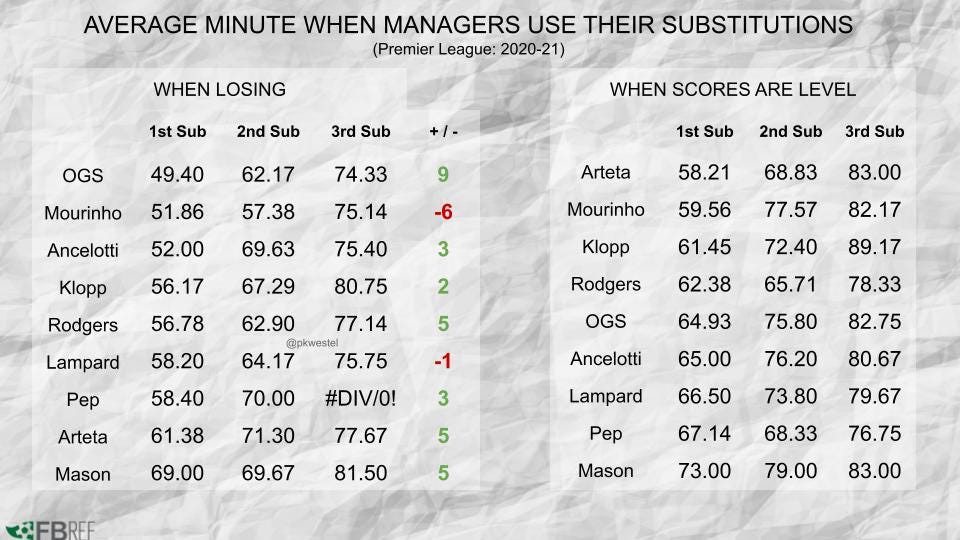
There’s a lot that jumps out from this and we’re going to break it all down. As you can see when behind Solskjaer has been the quickest to make his first change this season and only Mourinho has made his second change faster. You may think that’s because United have fallen behind so often this season but in actuality they’ve only trailed at halftime five times this season. In four of those games Ole made halftime substitutions, in the fifth, the starting XI equalized shortly after the break. When things are level Ole is much closer to the middle, with only Pep, Lampard, and Ancelotti behind him (two of those guys ain’t bad company either).
You may have also noticed that fourth column labelled plus/minus and been wondering “what the hell is that?” That’s a great question.
Telling us when a manager makes his changes is nice, but wouldn’t it also be nice to know how effective the changes he makes are? How can we quantify that?
You could look at how many points each team has won from losing positions this year but that’s an extremely false table. City have only gone behind five times this year, so naturally they won’t have many points. Tottenham have won six points from losing positions this year but three of them came in a match where they were 1-0 down inside a minute and 2-1 up after eight minutes.
United have had some good comebacks this year, but they’ve won so many points from losing positions thanks to constantly going down within the first 10 minutes leaving them 80 minutes to rectify the situation. In all but five cases they’ve rectified the situation by halftime.
Points won from losing positions is a nice metric that adds a small piece to the puzzle but on it’s own it’s useless. It also doesn’t take into account points dropped from winning positions. That’s right, managers don’t just make substitutions to win them games, they also make them to see out wins they already have, and sometimes those don’t work. There’s also the third area. When things are level and you look for a winner, but it’s your opponent who gets it.
As such I tried to come up with a way to measure how managers substitutions impact a match and change the match state. I went through all the matches from these eight teams over the last two seasons. The sample totaled 478 ‘unique’ matches (unique for every manager so a City vs Everton match is two matches, one for Pep and one for Ancelotti and doesn’t include United matches).
I looked at the game state of when the manager made his first substitution by choice (IE not an injury enforced sub), and compared that with how the game ended. If there was a change in the outcome then you were awarded points the net amount of points. For example if the game was level then each team would be getting a point. If you end up winning the game after your first change you’ve gotten three points so you increased your point total by +2. If you were down and ended up with a draw it’s +1 etc.
We weren’t trying to get picky with the scoring here. It doesn’t matter if the sub you made had nothing to do with the goal that was scored. If you made a sub and the game changed you got the points.
However by that same token it goes the other way as well. If you made a sub when you had the lead and the game ends up drawn, you’ve dropped two points. Even if the sub wasn’t the reason you lost, the points are taken away from you. Same system all around.
Is this a perfect metric? Far from it, and especially not on it’s own. But it does help paint a bit of a clearer picture that helps us see why managers may do what they do.
If we go back to the table we’ll see that Solskjaer is a +6, trailing only Pep who is +7. Solskjaer’s +6 is certainly aided by three point swings against West Ham and Southampton. Pep racks up his number thanks to a lot of games staying 0-0 until late, and his team finding a late winner.
Now we can look at how the table played out last season.
It’s certainly quite different. Last season Ole Gunnar Solskjaer was among the slowest to make changes when behind (likely for reasons discussed above), and was by far the slowest to change things up when things were level.
What’s interesting though is looking at the two guys who were more patient then Solskjaer; Pep Guardiola and Jurgen Klopp, the two managers who finished first and second in the league. (Liverpool were only level at the first sub four times last season, so that number is slightly skewed given in one of the four Klopp made a halftime change. That match ended 0-0).
Klopp is an interesting one to look at. That +11 makes it seem like he was pushing all the right buttons, but in truth the game state only changed after his substitutions five times. Liverpool lead the league with 19 points won from losing positions but only seven of those points came after Klopp made subs. He was hesitant to make changes because he trusted the players on the pitch to work it out. Or in other words he felt that his best players were already on the pitch. Bringing someone off the bench wasn’t going to make them better.
When comparing the +/- numbers of the managers between the two seasons we can see that it’s a very volatile number. Most managers tend to fall between 3 and -3, any larger or smaller isn’t typically backed up. Klopp racked up a +11 thanks to never dropping points late in games. Brendan Rodgers hit +8 in a rather different way. Whereas Liverpool’s result only changed after Klopp’s subs five times, Leicester’s changed in 13 games. Seven for the better and six for the worse.
It’s not so much an indictment on Rodgers but just a difference in his substitution patterns. For most of the season Rodgers would basically either sub Ayoze Perez on, or off, around the 60th minute. Leicester played a lot of tight matches that featured late goals. Sometimes they went for them to earn him and sometimes they went against him.
The last thing that jumps out is Mauricio Pochettino being much quicker to change things up when things are level. For obvious reasons, Solskjaer and Pochettino were constantly compared last season and this was cited as one of the reasons to make the switch from one to the other.
This raised my eyebrows a bit. I’ve got a lot of friends who are Spurs fans and one of their biggest complaints about Pochettino was that he waits too long to change things up. So let’s take a closer look at his last two and a half years in charge at Tottenham.
That’s a bit of a different story. Pochettino was pretty consistently very patient when it came to making changes. The +5 in 2017-18 indicates they generally went in his favor. As anyone who watched Tottenham over the past few years knows, Poch’s decline really began around January 2019 - Spurs trip to the Champions League final helped mask this. That decline appears in the substitution data as well. In the first half of the season the average time of the first sub when losing came was 71.75 and when 64 when level for a +/- of 4. In the second half those numbers dropped to 61.17 when losing and 63.67 for a +/- of -4.
His final season saw those numbers drop even further. Poch was constantly changing his starting XI, and it clearly wasn’t working as he was all too eager to change it up, though that wasn’t working too well either. His substitution patterns seemed far less tactical and far more like a man who was out of ideas and was just trying to see if anything would stick. The fact that his final change when things were level came so late in matches tells us two things: he was only really using two subs to begin with and things had gotten so bad that now he was making subs to try and hold on to a draw.
It’s telling that Mourinho - a notoriously early substituter - came in, was a little more patient with his subs but had quickly settled on a starting XI and managed to put up a +8. The splits here aren’t too different from the last team Mourinho managed for half a season…
Mourinho’s stint in 2018 also looked like a man who was fresh out of ideas. He was constantly changing the starting XI and was all too eager to change things up. Solskjaer came in, established a starting XI, was a little more patient with his changes and put up a +5 compared to Jose’s +1.
Making changes earlier doesn’t necessarily mean you’re more tactically astute. It could mean you got your tactics wrong and you’ve recognized that. It could also mean you just think you’ve gotten it wrong, because you haven’t scored yet, but you haven’t. And when you change it up you’re actually making things worse.
That raises a pretty good question. How often do substitutions actually work?
Again there’s no way to definitively answer that question, but based on the same parameters we’ve been using the answer we can get to is ‘not that often.’
In our 478 game sample there were 256 wins, 90 draws, and 131 losses. In 79.3 percent of those wins and 72.52 percent of losses the result was established before any subs were made. That number drops to 62.22 percent in games that ended in a draw (56 games).
This helps shed some light on why managers across the board are more hesitant to make changes when things are level. When you’re winning or losing a match the next goal - regardless of which side scores it won’t necessarily change the outcome. When things are level, the next goal will definitely change things, but it might not be in the direction you want it to be in.
In the 478 game sample, 29 times a draw turned into a loss after subs were made (22.14% of total losses). 44 wins came from a level game being broken after subs were introduced (just 17.19% of total wins). 14 of the 90 games to end in draws (15.56%) came from an equalizer that came after the manager made his first sub. Only eight times did a team turn a loss into a win after the manager made his first change. Remarkably, the opposite has occurred (a win turning into a loss) nearly as often (seven times).
That’s kinda the thing here. Where 14 times a team scored a late equalizer to turn a loss into a draw, 18 times (20%) draws came from a team losing their lead after making their first change.
More points seem to be getting dropped after subs are introduced than points won. Dare I say… substitutions mostly don’t work?
Perhaps that would explain these statistics. In 21.37 percent of games that ended in a loss, the manager didn’t make a third substitution. One out of five! This season Pep Guardiola has yet to make a third substitution in a game that he’s trailing. Perhaps he doesn’t know what to change - as we saw against Manchester United - or perhaps he’s so confident in Plan A that he doesn’t even have a Plan B, and he doesn’t think the players on the bench will be better for Plan A?
To go even further, 26.67% of the matches that ended in draws didn’t see the manager use all three subs. An even higher number. This tells us a few things. Managers aren’t going to go all out to get a win, they’re too afraid of a winner being scored against them. (The overall lateness of the third subs in games that are level tells you there’s a shift towards defensive subs in general).
More importantly, we see that managers don’t really think there’s any better options on their bench. Their best players, the ones who they trust to go and win them the game, are already on the pitch!
This makes a lot of sense. After all there’s a reason those players are in the starting XI to begin with. Injuries also play a role. When players get hurt they’re replaced by guys on the bench on those bench spots get filled by players even further down the pecking order. The further down you are the less likely the manager will trust you. This season there was a three game stretch where Brendan Rodgers only made one substitution in two of those games. That was during the festive period. Even with his squad running on fumes he didn’t trust his bench!
Sure managers get their tactics wrong from time to time but the overwhelming majority of the time they don’t. That’s why these guys are in the jobs that they’re in.
To compare Solskjaer’s numbers to the rest of the group, 91.18 percent of his wins over the last two years have been in hand before he’s made changes. That’s the same for 75 percent of his losses and 61.9 percent of his draws.
That very high number for wins tells us that he’s really not that strong at turning draws into wins. Over the past two seasons only twice has he introduced a substitute with the game tied and turned it into a win. Both came this season and in one of those, his introduction was Paul Pogba, a player typically in the starting XI. Last season he was able to turn four losses into draws, but never a draw into a win.
That leaves room to argue that perhaps he could have turned more draws into wins had he just made changes sooner. Of course you could also argue that if he did that, perhaps United concede a goal and don’t even get a draw.
This isn’t to say that Solskjaer has been right all the time. I certainly believe he waited far too long to make changes in United’s match against Chelsea at Old Trafford back in October and had he done them sooner United very well could have won. He also could have changed things up sooner a week later against Arsenal, or against Sheffield United in January. Not to mention the changes he did make were questionable at best.
Any manager will always have a few games where you can pick apart their decisions. On the whole, when it comes to the effectiveness of Solskjaer’s changes, there’s certainly room to grow.
When it comes to the timing of his substitutions though, it’s foolish to say ‘he waits too long to make changes.’ Not only do the numbers show that not to be true, but when comparing him to the rest of the top managers in England, he’s right in the mix with all of them.




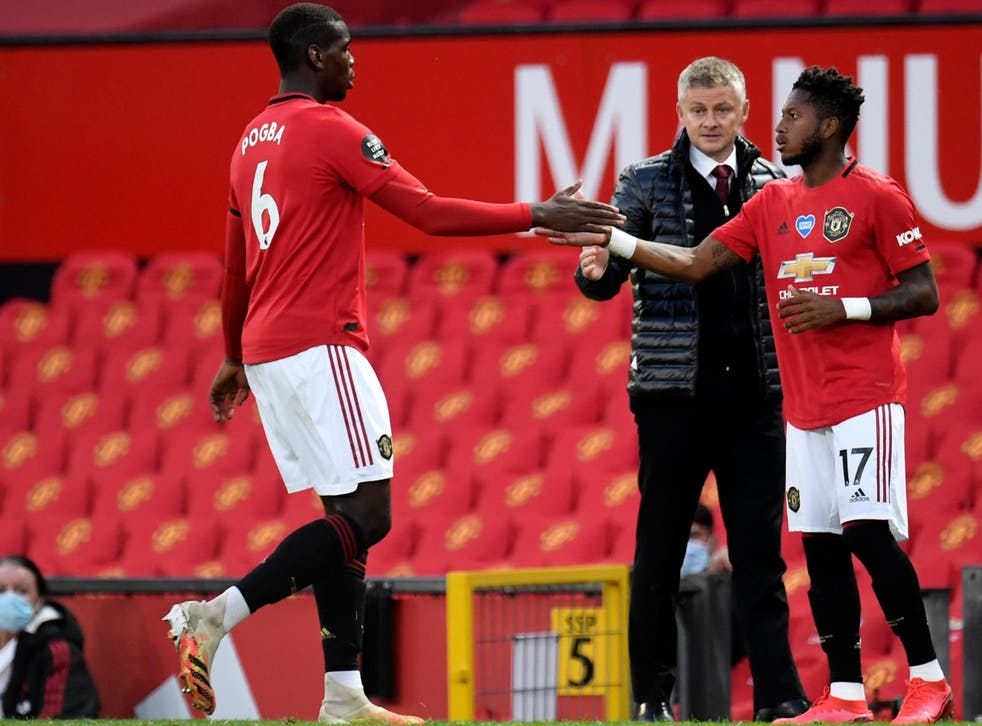

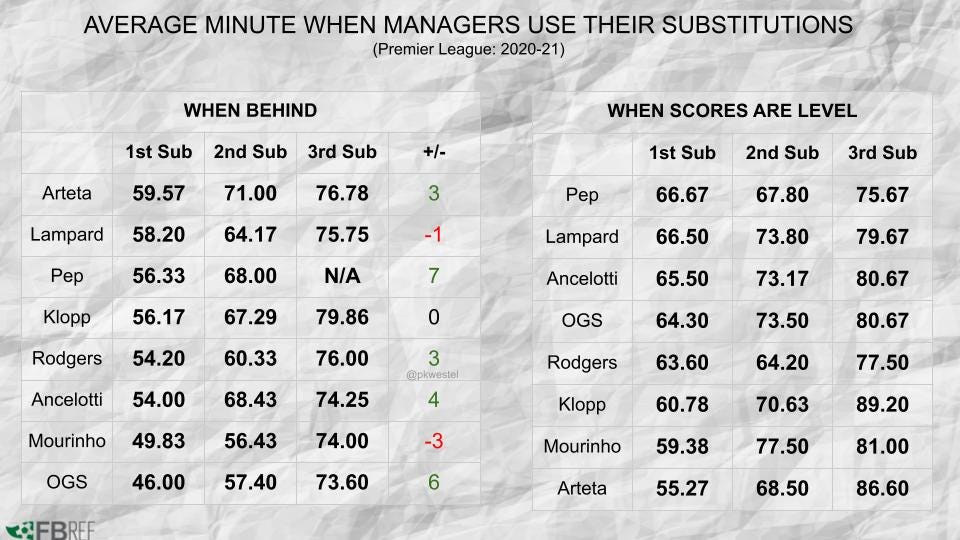
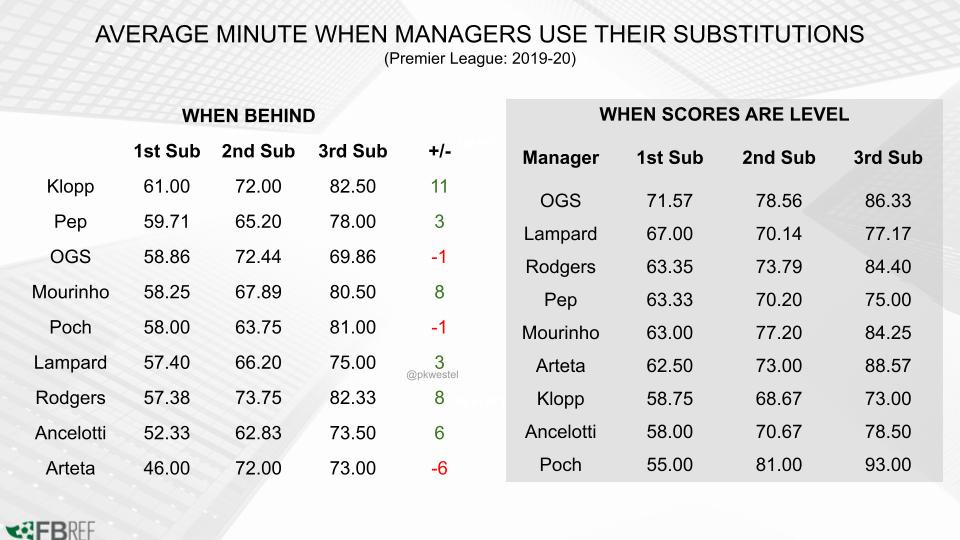
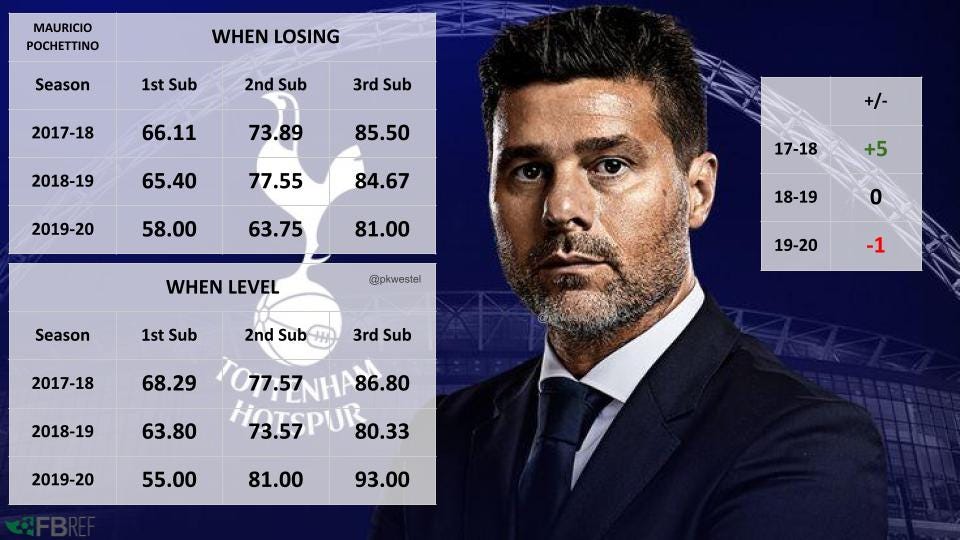
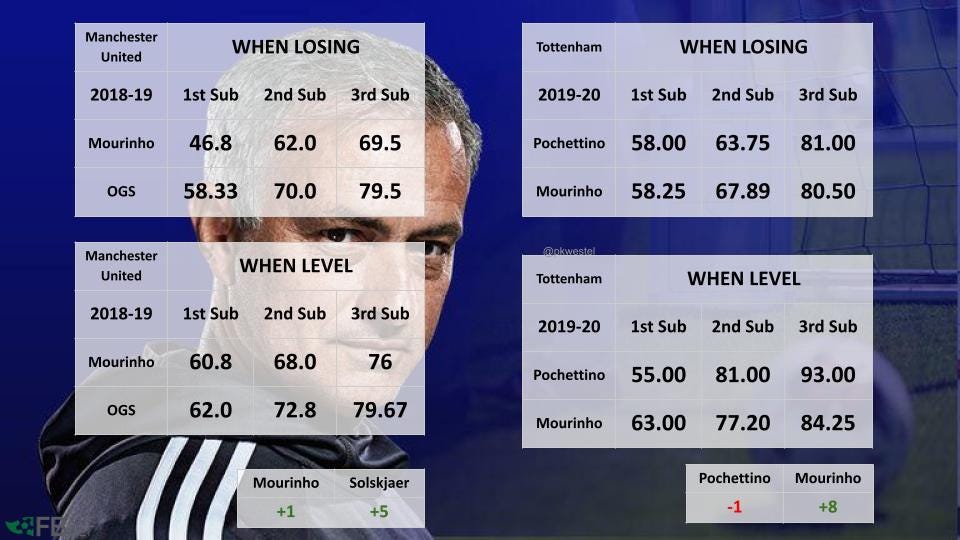
I need you compare to this season. Because squad depth is better than the past. He has more choice for substitution.
nice bro, i just read it today, love it from Manucians <3